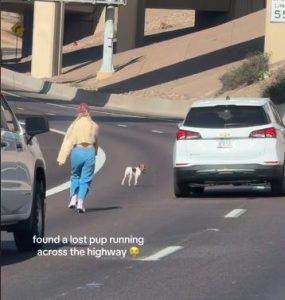
Woman Rescues Lost Dog from Busy Highway
In a heartwarming display of courage and compassion, a woman risked her own safety to save a lost dog from the perilous path of a busy highway.
The incident, captured on video and shared on TikTok, has since gone viral, inspiring countless viewers around the world.
The video, posted on November 24th, shows the small, terrified dog darting between moving cars, oblivious to the imminent danger.
A woman, who was traveling to Arizona, quickly sprang into action, abandoning her vehicle and rushing into the traffic to rescue the frightened animal. The video continued showing the dog in a vehicle seemly relaxed.
“We caught him,” an overlaid text on the video simply reads, encapsulating the nail-biting moment of the rescue.
The caption accompanying the video provides further details about the incident revealing that despite the dog wearing a collar, he had no identifying information or microchip. “Today was a scary one for this little guy he was wearing a collar with no information or microchip,” the caption reads further revealing that the pup “is now safe at the Maricopa County Animal Shelter.”
The heroic act has garnered immense praise and admiration from online users, who have flooded the comments section with messages of gratitude and appreciation. Many have expressed their astonishment at the woman’s bravery and her selfless commitment to helping the lost dog.
“Thank you for doing this!! I’ve seen too many dogs on the sides of the highways and roads here. People are heartless,” one user shared. “Wow thats a dangerous exit but gir,l i would of got off too.thank you for being brave and saving that boy!” another person added. “You literally risked your life for that pup! Phoenix traffic doesn’t play,” one user shared.
One person even suggested that since the dog “has a collar, it could be someone’s missing baby”
@gmgomps Today was a scary one for this lil guy 🥺 he was wearing a collar with no information or microchip – he is now safe at the Maricopa County Animal Shelter ❤️ #lostdog #phoenixaz #dog #dogsoftiktok #lostdogfound #maricopaanimalshleter #shelterdog #rescuedog ♬ Beautiful things – audios🫡
Every day, thousands of pets disappear from households all throughout the nation. A devastating separation can result from a brief slip-up, an open gate, or an irresistible distraction.
The American Humane Association estimates that there are approximately 10 million missing pets annually. For a small percentage of these animals, this startling figure results in a favorable conclusion.
Those who possess microchips are favored by the numbers. They have a 52% probability of being brought home, which puts them closer to overcoming the odds.
The vast majority of animals, however, do not have microchips. According to surveys, only 2.2% of dogs who are not microchipped ever make it back to their owners. About 80% of all dogs and cats that are left unidentified will never be found again.
Microchipping has revolutionized the field of lost pets. It’s similar to giving your pet a small, indestructible ID card that they will carry with them forever.
Implanted beneath their skin, this rice-sized chip contains a unique number connected to your contact details. A quick scan at a veterinarian’s office or animal shelter can identify your dog and guide you back to them if they ever become lost.
It’s a more dependable and long-lasting option than conventional collars and tags, which are prone to falling off or becoming unreadable.
A study conducted at animal shelters across 23 states, involving over 7,700 stray animals, revealed that microchipped animals have a far higher chance of being returned to their owners.
More than twice as many microchipped stray dogs were returned to their owners in that study than all stray dogs combined. The disparity in return rates for stray cats was considerably more pronounced.
An inaccurate or disconnected owner phone number in the microchip registry database was the most frequent cause of microchipped animals not being returned to their owners.


